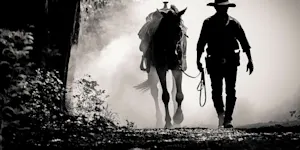What Makes This Word Tick
"Ah, hamartia," a word so drenched in drama that even Shakespeare would raise an eyebrow. It’s a term that whispers about tragic mistakes or fatal flaws, often bringing an otherwise heroic figure to their downfall. Ideal for discussing the downfall of towering figures both in fiction and history.
If Hamartia Were a Person…
Picture this: Hamartia would be the charming yet slightly oblivious protagonist of a grand drama, wearing a fine but slightly fraying suit, with a knack for making decisions that seem perfect, yet just miss the mark. Perhaps a little like that old friend who always takes a turn down the wrong road at exactly the wrong time.
How This Word Has Changed Over Time
Originally from the Greek tragedy lexicon, "hamartia" has wandered through centuries, carrying the bittersweet weight of human imperfection. Once strictly tied to literature, it’s spilled over into describing real-life errors with potentially disastrous consequences.
Old Sayings and Proverbs That Use Hamartia
While not literally present in old sayings, the concept of hamartia resonates with "pride comes before a fall." It captures the same spirit—a reminder that unchecked flaws can lead to trouble.
Surprising Facts About Hamartia
Here’s a twist: Aristotle coined the term in his work "Poetics" to explain the protagonist's mistake in a tragedy. Despite its prevalence, it’s often misinterpreted solely as a character flaw when it originally referred more broadly to an error in judgement or lack of insight.
Out and About With This Word
Keep your ears tuned for "hamartia" in debates about leadership, literature seminars, or even film critiques. It's particularly at home in discussions about why certain big decisions can go gloriously, terribly wrong.
Pop Culture Moments Where Hamartia Was Used
Imagine the infamous phrase, “With great power comes great responsibility.” Often, when heroes falter in movies or TV, it’s their hamartia that audiences are witnessing—a nod to those Greek-aged concepts no less relevant today.
The Word in Literature
Hamartia has strutted across the pages of famous works, from "Oedipus Rex" to Shakespearean plays, often describing protagonists whose grand errors lead to their undoing. It graces serious, thought-provoking narratives where characters are as layered as a rich tiramisu.
Moments in History with Hamartia
Think of the Roman Empire's downfall, a sequence of missteps and ignored truths that proved to be its hamartia. History has no shortage of grand stories where mighty leaders lose touch with reality leading to quite a conundrum!
This Word Around the World
While "hamartia" is directly borrowed from Greek, the essence of the word thrives in every culture. Each language has its own tales and expressions warning against the pitfalls of character flaws, steeped in unique local wisdom.
Where Does It Come From?
Straight from ancient Greece! Created by Aristotle, "hamartia" is derived from the root word meaning “to miss the mark,” embodying that crucial lapse of judgment which even the wisest can fall prey to.
How People Misuse This Word
Often, hamartia gets boxed into meaning a character flaw, but Aristotle’s take was broader, enveloping both flaw and fateful mistake as central components.
Words It’s Often Confused With
Hubris: Often mixed up with hamartia, hubris refers explicitly to excessive pride.
Fallibility: General human tendency to err, not quite capturing the tragic scope of hamartia.
Additional Synonyms and Antonyms
Synonyms include error, mistake, flaw. An antonym might be perfection, but that feels a bit presumptuous in our flawed human world, doesn’t it?
Want to Try It Out in a Sentence?
“It was his hamartia, believing he could change everyone’s mind with charm alone, that led to the unfortunate outcome.”
There you go! "Hamartia" is ready to add a touch of tragedy and introspection to your day.
















